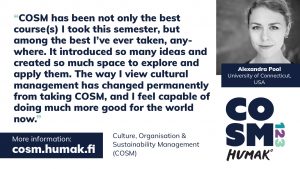The Many Dimensions of Sustainable Development: Ecological, Economic, Social, and Cultural

Sustainable development is not just about ecological sustainability, climate change, and extinction of species. It also has economic, social, and cultural dimensions. Universities of applied sciences have a significant role in determining what kind of expertise is available for each dimension. Humak’s aim is to encourage students to take an active role as forerunners in the production and implementation of multidimensional and sustainable development models.
For decades, humanity’s demand on nature has exceeded what our planet can replenish (WWF). Therefore, new and sustainable solutions are needed to remedy the critical situation. For this reason, sustainable development has been integrated to a greater extent into the content of courses at Humak.
Sustainable development is extensively explored in the COSM (Culture, Organization & Sustainability Management) study module offered by Humak. Click on the banner below to learn more about COSM. Instructions on how to register for the courses are given later in this article.

Dimensions of Sustainable Development
According to the UN Sustainable Development Goals, sustainable development concerns all human activity and aims for universal well-being, equality, and safety.
The significance of sustainable development in work life and entrepreneurship is already substantial and will only become more important in the future. Authorities and legislation guide production and business towards more ecologically, socially, and ethically sustainable solutions.
Consumers are also increasingly environmentally conscious, which affects their purchasing decisions.
Cultural Sector Can Be a Forerunner as a Producer of A Sustainable Future
Sustainable development is extensively explored in the COSM (Culture, Organization & Sustainability Management) study module offered by Humak. The aim of the three courses is to familiarize managers, decision-makers and artists in the cultural sector with sustainable ways of working.
“All COSM courses have been extremely important and good. They go into the deep waters of cultural production; the topics are broad and global! Billion thanks to you for all the COSM courses!” –Salla Raunio
Innovative ideas have already emerged among our students, such as a new sustainable film production plan.

Registration for the Next Courses Is on 21.2. and 28.3.2022
The COSM courses consist of webinars and discussions that bring together international experts in the field. The courses explore the dimensions of sustainable development and highlight approaches on how managers, artists, and decision-makers in the cultural sector can act as ”producers of sustainable development”. The courses also cover the responsibilities of organizations to incorporate sustainable production practices into their operations from economic, social, ethical, and ecological perspectives.
- Registration deadline for Cultural Entrepreneurship and Sustainability Management (5 ECTS) is on 21.2.2022. The first of four webinars will be held on March 3rd. The course introduces students to sustainably produced cultural events and festivals, and discusses the significance of sustainable values for entrepreneurs in the creative sector. Register for the course here.
- Registration deadline for Cultural Management & 3 Dimensions of Sustainability: Environmental, Social & Economic (5 ECTS) is on 28.3.2022. The first of four webinars is will be held on April 7th. The course explores how environmental, social and economic issues related to sustainable development are taken into account in cultural productions. Register for the course here.
The courses are offered at Humak Open UAS and are open to everyone, regardless of educational background or geographical location. The courses are related to the Cultural Manager (Master’s Degree) education and the completed studies can be accepted as part of your future or ongoing studies.
Sources:
COSM website. Accessed 15.2.2022. https://cosm.humak.fi/
WWF (World Wide Fund for Nature). Ecological Footprint. Accessed 15.2.2022. https://wwf.panda.org/discover/knowledge_hub/all_publications/ecological_footprint2/
United Nations. Sustainable Development Goals. Accessed 15.2.2022. https://www.un.org/sustainabledevelopment/sustainable-development-goals/
Text: Jarmo Röksä
Translation & editing: Mari Ervasti
2022-02-16 16:57:06